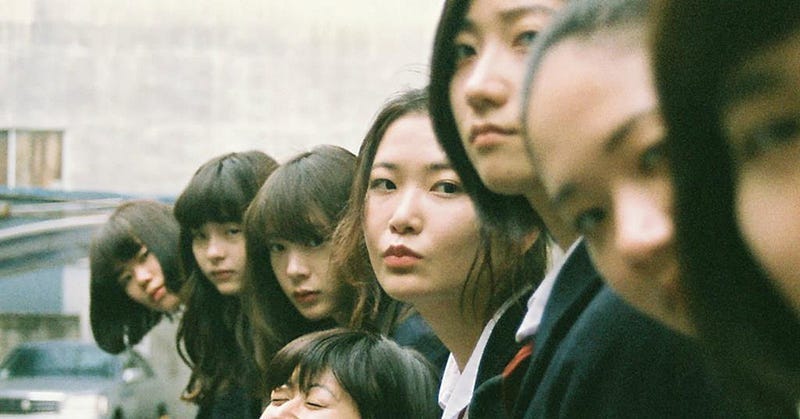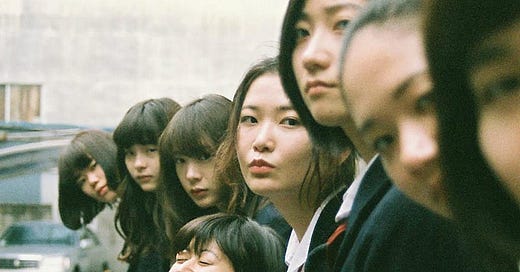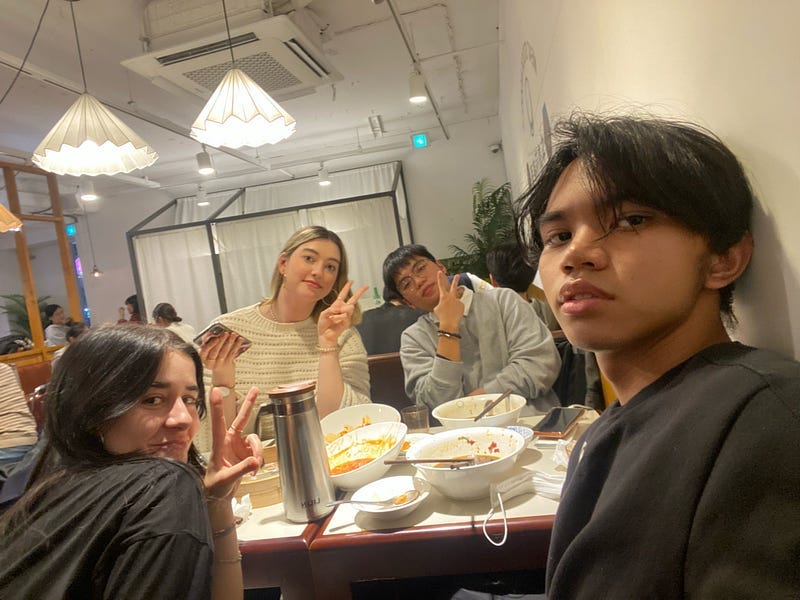Deep into the trenches of the COVID-19 pandemic, came this story of a school-girl weaving through the mundanities and humdrum of life in a small, rural town in Japan. She wore chequered skirts, shod her stout feet in black Mary Janes, and evened her bangs in such a way that they touched the top of her thick bristly eyebrows. Her name was Mayuri. She was a track-runner, and her personal drama was that of a troubled relationship that she shared with her dead mother, whom she would meet not too long after the opening chapters in a fantasy world. In the charter of this world, golems and ogres existed, and an ancient civilisation built and modelled after socialism comforted a collection of lost souls stuck in purgatory. Before its subsequent rebrand a couple years after its inception, the novel was called Sheaf, and I wrote it only to save myself.

Not too long after having graduated high-school, I was diagnosed with depression and a severe case of OCD, the latter of which had manifested in the same year I had begun writing. Academically, I was stumped, and enrolled in a university with a major I wasn’t sure about. I held a deep-rooted malice and resentment over decisions I made that led to my enrolment. After a difficult time grappling with my disorder, and largely unsuccessful efforts at finding professional help, I was awash in catastrophic misery and struggled to see light at the end of the tunnel. My days were filled with me staring up at the ceiling, clamping my eyes shut, and having the stories of my characters, of Mayuri, and Erina, and Aunt Mimi whir into life before me. About me, my peers were thriving, coming up, and while I did not know the extent of their personal conflicts and battles, their days seemed to me filled to the brim with great ventures; living life felt much like eyeballing a snow-globe and observing its stateliness and privations, while being subtly disturbed by its deafening silence and inherent lack of being.
Life moved on anyway. Sheaf had undergone major rewrites and lost some of its original slice-of-lifeness and identity, having been renamed They Know What We Forget. I began meeting friends from my university. I modelled. I joined communities and organisations, only to promptly abandon them. I met someone. I loved someone. I found best friends. I was shirking my responsibilities as a writer because I was somewhat ashamed in the craft, and in my own abilities. It was never a financially nor academically prudent idea to funnel much of my time and resources to be a fiction writer, but I had never expected the loneliness that came with it, and the crippling self-doubt of a writer. It sounded inconceivable that any publisher would want Sheaf, though I toiled over the novel anyway. I had only submitted its full manuscript three times — one to a very small publisher that was interested but with whom I had creative disagreements with, and two to a bigger publishing house that saw promise in my writing but ultimately rejected it and reasoned that I wasn’t ready, and that there was too much work to be done to the story to justify the risk of taking it. Additionally, I had a hopeful starting conversation with an agent regarding the manuscript, though I ultimately decided to back out. I stressed over the urgency of it and had numerous nervous breakdowns in the following months, unable to cope with deadlines and progressively encumbered by my deteriorating OCD and anxieties. Only then, did I give up on Sheaf. Upon reading the email by the big publisher, I closed the writing interface where I worked on the novel and laid on my bed. I thought of Mayuri, again. She was sitting by my bedside and thanked me for her existence. Light from the overhead fixture touched her face here and there, and she seemed so very real. And so I thanked her too, and held her hands together, resting my forehead on both our hands. I thanked her for my life.
Late into 2021, I began writing again and started on my second novel, Love Blossom. My then-girlfriend had commissioned for me to write for her birthday, and I ultimately decided on this epic historical fiction book that was loosely redolent of a Pachinko, a Pulang with a louder and much more abrasive voice, jumping between eras and timelines and featuring everything we loved together: music, pop culture, art, among many other things. It depicts bereaved siblings Cahya and Amelia as they navigate grief and loss. A recurring theme had begun to unshed itself between the lines: a troubled relationship with a mother. Through history and stuff (idk), they travel to other countries and reconnect with old family members, and unravel a lost history that affects everyone involved. It should be clear to you now that this is my least favourite novel. I don’t remember much of it and why I wrote it in the first place.
I never got to print the book for the person it was written for because we had broken things off not too long after it was finished, and also chiefly because its quality and writing did not inspire enough confidence for me to continue. It was stuck in its first draft because I felt that it needed a huge rewrite for the larger story to make any sense, though it was indolently ambitious (and in some parts, actually compelling and moving). Scrolling through my Microsoft Word and trying to point out items of the story that needed reworking and rewriting would drive me up the wall, and I was more than ready and poised towards the tail-end of the book to get it over with. And though it was overwritten and very on the nose in a lot of places, I did, at the very least, see it as a good exercise to write as much I can and find my voice.
Before moving to Korea, I started on my third novel, Starlight (working title). This was the only novel I never finished, though I would not at all attribute its incompletion to failure. Starlight was a direct sequel to Sheaf; its California-residing protagonists, Luca and Hayeon, find that the eccentric high-school teacher of their teenagehood, an avuncular Indonesian man who would have otherwise been on his way to the grave already, has de-aged a good 40 years and now ekes out a life of extreme indolences and lavishness as an idol. Conversely, Mayuri finds out that Ophelia, a character of paramount importance in the book’s prequel, is dying with cancer. About ten or so chapters in, I stopped writing Starlight because I had fallen in love with another story and could not ignore it any longer. I can’t say much about this one as I have yet to return to it, but I do remember it pulsating with a fair amount of thematic strength.
Around the time of writing Starlight I began to see improvement in my own writing. There was so much more to learn and practice, but two hundred and fifty thousand words of pure continuous fiction will do something to you. I began to see prose differently in my favourite novels. Technique and patterns surfaced from songs, films, and video game writing. There was a tempo to prosody. Well-written sentences appeared to me to the tune of music, like how sweet a major-seventh chord would sound to my musically-trained ears. I couldn’t begin to tell you if any of this self-curated education and constant writing and reading helped me at all in the long-run, but the fruits of my labour began to manifest in hope and conviction. I was beginning to feel confident in my writing, and bought a plane ticket to Seoul.
A month before Korea, something amazing happened: the story to stop Starlight. My fourth novel: The Snow Devours Us All (working title as well), is a modern, contemporary novel that borrows characters from Love Blossom in a completely separate story and plot, bearing no tethers to its predecessor.
In 1997, high-school lovers Meisya and Hansol separate after the former leaves Seoul. A little more than a couple decades later, Meisya’s son Cahya brings her to the snow-filled town of Daejeon, where they reunite, and the latter begins a romance with June, one of Hansol’s three daughters. His youngest, Sohye, is an aspiring fiction writer who withholds a trove of secrets that threaten to pillory the stability of their family.
Evocative of Sally Rooney’s spare-prosed novels, and roughly following the foundations of Lim Daehyung’s bruising and bittersweet Moonlit Winter — The Snow Devours Us All is my most spiritually resonant and honest novel yet. In its main characters I try to find a bit of myself: whether it was Hansol’s deluded pursuit of manhood, Cahya and Yerin’s struggles with mental health, Meisya’s receding drive to purpose, Sohye’s high ambition and June’s aching for true serendipitious love. As of right now I have never been prouder of nor have I thought of any of my novels in this high a regard, in some part, of course, owing to the menagerie of writers who beta-read and helped with the novel. The Bibis’ trips, Nami Island and Sokcho, helped extensively to widen the book’s reach and worldview. Other fellow writers supported the story and placed their utmost faith in me. Writing this book required gentle hands and an open-mind. I treated The Snow Devours Us All like observing a rare lunar moth perched on the surface of cheap muslin.
While I wrote Sheaf in the deepest pits of loneliness and hopelessness, I wrote The Snow Devours Us All surrounded by people who loved me and supported my stories greatly, as though they were business-angels investing in my start-ups. As such, the resulting product is my most true-to-life story, brimming with candour and honesty. It felt abnormally good to be writing about things I knew well, and of things that were in my direct periphery. None of this is to say the story is not without its flaws, however; stilted pacing in Book IV and a lack of focus on numerous characters mar and impair the story from being anywhere near perfect. It also feels — at times — extremely self-indulgent and awkward, in that its social politics is often rudely interspersed with irreverent and self-referential humour. Even so, it’s still full of heart and tacked with the imprints of some of my favourite people.
Additionally, I began to employ real-life research and journalism as a method of character-study. For instance, when I wanted to learn about Kwon Sohye, the aspiring writer, I talked to and interviewed several Korean students from Sungkyunkwan about their thoughts on the discord between aspiration and reality. I (legally) snuck into creative writing classes on campus to understand the Sohye that would have loved to be in the class, and then to Economics to understand the Sohye that would have held resentment for following the exact footfalls that led to her sister’s eventual demise. I hobnobbed with crazy rich Koreans in the business hall who all seemed to be hiding something from their estranged parents, whether it was clinical depression or that they were queer. I went to Hongdae at night to understand Yerin, and made out with all sorts of interesting people in the seedy underbelly of Itaewon’s nightclubs. And then I began seeing my characters in everyone. I began to see bits of Sohye in my good friend Soyeon, some of June in Adelle. Most importantly, this meant to me that my characters had taken a life of their own. Learning all there was about the people around me brought my original vision into sharp relief as it helped prune back all the clutter and uncertainties that held my other novels and short stories back.
Only then had writing a contemporary novel begun to make sense; I have walked through life and experienced some of the spiritual injuries that it has to offer, but I remain deeply privileged and there was always going to be someone suffering more than me. Investing energy on the trivialities of life felt so oddly disingenuous to me at first, but why? Relying on love and friendship to make sense of a systematically unfair life, can be epistemically harsh, inhuman, and cruel, but to the likely implausible extent that we’re all equal and hold the same rights, isn’t that what we subsist and exist for? To seek romance, make love, and find our kindred?
I am currently in the process of going over The Snow Devours Us All once more before printing it, because it’s a birthday gift manifested one year too late and I should probably be giving it to my friend around early May (I hope you’re reading this part girlie). As for plans to submit the book to agents for publication, I realistically see myself working on and refining The Snow Devours Us All for a good couple years until I’m fully confident with it. Even then, I see no good in rushing things, and will work according to a timeline that works for me best.
I am twenty years old as of now, and will turn twenty-one in August. I started writing Sheaf when I was seventeen. That means I’ve written for around three years now, on and off.
To the people who know me personally, I know it seems like my life revolves only around my novels. I’ve consistently identified myself as a novelist because it seemed to be one impressive feature of my disposition, though I’ve published nothing and made no money out of it. Even then, the weight of my characters and stories is something I can never overstate. In my mind, Mayuri is waiting on hand and foot for more of my books. I am confident that I will get published one day — but for the time being, it feels good to surf through life and understand it through my stories.






